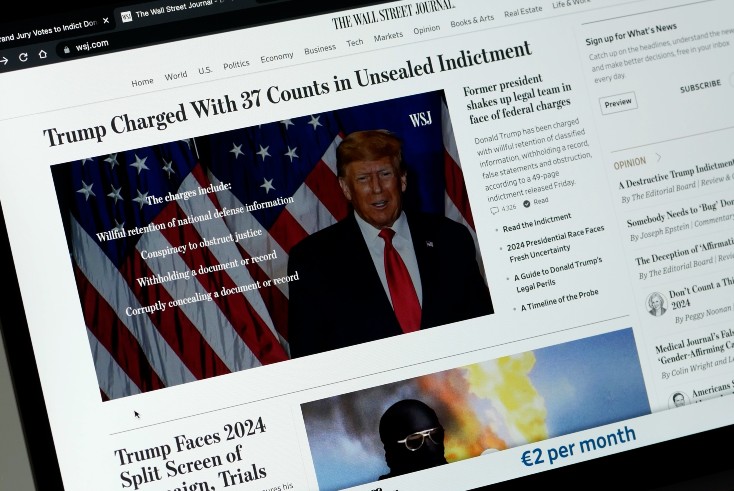Trust, collaboration, and the 'tsunami of crap': World Media Group members' key themes for 2024

Opinion
World Media Group members discuss the hot topics for 2024 in media and marketing, from elections and AI to cookies and support for quality journalism.
When it comes to the end of every year and I reflect on the past 12 months, the rate of change seems be enormous, and this year is no exception.
I think back to our predictions for 2023 when no-one had anticipated the game-changing impact of generative AI, and yet it turned out to be the story of the year.
Perhaps in this fast-paced world, it’s optimistic to be able to predict where we’ll be a year from now.
That said, when I asked World Media Group members about their predictions for the year ahead, there are some clear themes emerging that are likely to impact the world of marketing and media in 2024.
Advertising in an election year
There are at least 52 major elections taking place this year globally including the US, the UK and India. One of the biggest concerns we hear from marketers is whether it’s right to spend money on advertising in an election year.
Some brands worry that they will get lost in the noise of the elections, but a greater concern is the brand risk of advertising next to politically controversial content. I’d argue that if you’re advertising with a trusted, well-respected news brand, then you still get premium quality associations, even in hard news or very political content.
Jamie Credland, director at the World Media Group, takes this thought process one step further.
“In an election year, high-quality journalism is at a premium, with millions of people turning to trusted news brands to help them make their decisions. This creates a large, highly engaged audience, and a great opportunity for advertisers.
“Research from multiple sources, including during Covid, has demonstrated that advertising next to hard news doesn’t damage perceptions of the brand, and in many cases enhances it. Not only does this deliver commercial value for advertisers, but it helps fund the quality journalism that delivers value for voters.”
Mark Bembridge, CEO of Smartology, a contextual targeting ad-tech platform, says there needs to be a balance between brand safety and supporting publishers.
The brands he works with are very mindful about positioning their content alongside appropriate articles. “We saw during the last election that with all of the challenging news around Trump, certain brands wanted to add Trump to their exclusion list. But of course, that knocks out huge swathes of news in an election year.”
He expects similar things to happen next year, but for the benefit of the advertising industry, he says, “It’s important not to go too far the other way and therefore affect the available inventory that we can work with.”
Snoddy: In an election year, the press’s responsibility to truth is paramount
Generative AI and the ‘tsunami of crap’
One of the biggest challenges will be tackling misinformation and disinformation, particularly now that generative AI has made it so easy for people to create content. According to Mary Gail Pezzimenti, head of creative for the Washington Post Creative Group, many brands are coming to media companies for guidance on what they need to think about it when it comes to AI.
“Brands are subject to a lot of regulation around content and disclosure and transparency. Gen AI is making that landscape even more complicated because if you don’t know where the source content is coming from, or the source content has been pulled from 100 different places, that puts more of a burden on brands.”
Pezzimenti believes legal teams are going to need to catch up with a brand’s ambition. “I would say that most brands are sort of tiptoeing into it at this point. I think there’s an enormous amount of creativity that can be gleaned from AI artists and AI creators, but we need to make sure that the brand safety is there; that there’s transparency around the sources of the content.”
Credland agrees.
“The ‘tsunami of crap’ that Peter Kafka has previously described is a real danger. Creating content is going to become so easy that the search for quality will become more important. Gen AI can write a newspaper article, but it doesn’t have the editorial processes and safeguards, fact-checking and contextualising that a quality publisher has, which make all the difference.”
Podcast: Guardian upfronts and why AI-generated misinfo could be a blessing for newsbrands
That becomes particularly pertinent in an election cycle. “The ability for a tool that is so powerful to be weaponised against marginalised audiences to influence election cycles is a real concern,” says Damian Douglas, managing director, EMEA, TIME and president of the World Media Group. He’s optimistic about the benefits AI can deliver for marketers, such as modelling digital behaviours in real-time, which will increase performance on the advertising side of the business.
He’s less enthusiastic about AI on the other side of the business, which relies on editorial values and principles.
“I’ve always believed that good journalism and good journalists introduce you to subjects that you might not think you want to know about, but you should know about. That’s where generative AI lags behind – that human aspect. I think we’ll end up in a position where if you’re reading AI-generated content, you’ll see it clearly labelled on sites.”
Cookies, context and creative
Quality journalism attracts loyal followers and, consequently, established media brands have access to a treasure trove of first-party data, which helps them to understand how their audiences are interacting with content. With Google confirming that third-party cookie deprecation is finally going to happen in October 2024, this source of data becomes even more valuable to marketers.
For Smartology, the impending absence of cookies is good for business. Its SmartMatch platform provides a solution to the privacy challenges in the online advertising market by contextually targeting content to a publisher’s audience. “Privacy is becoming a bigger and bigger issue,” Bembridge says. “As the industry prepares for third-party cookie deprecation, contextual targeting is making a huge resurgence and we’re seeing the appetite for clients to test privacy-first zero-party data solutions. As a business, it’s very exciting.”
From a creative perspective, Pezzimenti thinks a focus on first-party data will drive a move towards more custom content creation and more interesting collaborations that allow brands to tell their story. “We have an audience every single day that’s telling us what they’re interested in. I hope some of the silos will break down between agencies, media companies, platforms and brands, so that we’ll increasingly see more interesting marketing partnerships.”
Emma Winchurch-Beale, VP growth partnerships UK at Economist Impact, says there’s an appetite for more meaningful content projects as brands continue to want to be more authentic. “Brands don’t want to be accused of greenwashing or doing something that doesn’t have substance to it,” she says. “Because of this, there are more stakeholders involved in programme decision-making and the sign off process is taking longer, but the result is more impactful partnerships and longer-term relationships.”
The Washington Post currently has a newsroom partnership with Imagine Entertainment, and they are talking about collaborating with them on more branded content work. Pezzimenti thinks we’ll see more brand partnerships announced in the year ahead. “Tribeca X now has a segment at the Tribeca Film Festival where they show branded entertainment,” she says. “There’s talk of TikTok extending to have an area of 30-minute content on the platform. I think we’ll see brands doing a lot more work in that space.”
Challenging times call for collaboration
What I’m hearing is that despite some significant challenges, 2024 feels full of opportunity. Yes, it’s an election year and we have to manage the instability that goes with that, but when it comes to advertising, with trusted partners there’s no reason why it shouldn’t be business as usual.
As for generative AI, with the right handrails in place, it will free up marketers from the more mundane tasks, allowing us to concentrate on finding out more about our audiences and their behaviour. That in turn will lead to the creation of more compelling content with symbiotic partners to keep those audiences engaged.
But the key is collaboration. From fighting against misinformation and disinformation, to finding optimal solutions around privacy, and getting the right regulations in place for Gen AI, the industry is stronger when we act as one. I hope to see publishers, agencies and brands sharing knowledge and tackling these issues together, so that we can unlock the full potential of 2024.
 Belinda Barker is CEO of World Media Group, a strategic alliance of international media organisations.
Belinda Barker is CEO of World Media Group, a strategic alliance of international media organisations.
Its members include The Atlantic, BBC News, The Economist, Forbes, Fortune, Insider, National Geographic, Politico Europe, Reuters, The New York Times Company, The Smithsonian, TIME, The Wall Street Journal and The Washington Post, and partners Brand Metrics, Dianomi and Smartology.




